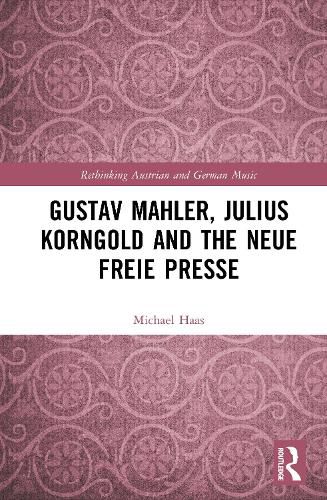Readings Newsletter
Become a Readings Member to make your shopping experience even easier.
Sign in or sign up for free!
You’re not far away from qualifying for FREE standard shipping within Australia
You’ve qualified for FREE standard shipping within Australia
The cart is loading…






Julius Korngold, critic at the highly influential newspaper Neue Freie Presse, was close to and supportive of Gustav Mahler and, for the first time, essays on the man and his music are made available in English. Those on his time at Vienna's Imperial Opera are extensive and well informed.
Both Korngold and Mahler shared a common Moravian Jewish background, born in 1860 and both students of Anton Bruckner. The paper was Jewish owned, and Theodor Herzl, the founder of the Zionist Movement, was its cultural editor and Korngold's employer. Claims that Mahler was driven out of Vienna by an antisemitic press are shown to be wrong, given Mahler's support by the most powerful critic of the day writing in the Empire's most influential newspaper. Importantly, the essays also reveal a world of Modernism that includes Mahler's innovations at the opera, and Modernism in music before departures from tonality. Mahler was claimed by Arnold Schoenberg as his musical hero, firmly placing him in the Modernist camp. Yet Korngold was universally seen as an archconservative and his relationship with Mahler was personal and his understanding profound. The book addresses the question of "Mahler, the first Modernist or the last Romantic?".
The book will be invaluable for Mahler enthusiasts, musicians, musicologists as well as cultural historians.
$9.00 standard shipping within Australia
FREE standard shipping within Australia for orders over $100.00
Express & International shipping calculated at checkout
Julius Korngold, critic at the highly influential newspaper Neue Freie Presse, was close to and supportive of Gustav Mahler and, for the first time, essays on the man and his music are made available in English. Those on his time at Vienna's Imperial Opera are extensive and well informed.
Both Korngold and Mahler shared a common Moravian Jewish background, born in 1860 and both students of Anton Bruckner. The paper was Jewish owned, and Theodor Herzl, the founder of the Zionist Movement, was its cultural editor and Korngold's employer. Claims that Mahler was driven out of Vienna by an antisemitic press are shown to be wrong, given Mahler's support by the most powerful critic of the day writing in the Empire's most influential newspaper. Importantly, the essays also reveal a world of Modernism that includes Mahler's innovations at the opera, and Modernism in music before departures from tonality. Mahler was claimed by Arnold Schoenberg as his musical hero, firmly placing him in the Modernist camp. Yet Korngold was universally seen as an archconservative and his relationship with Mahler was personal and his understanding profound. The book addresses the question of "Mahler, the first Modernist or the last Romantic?".
The book will be invaluable for Mahler enthusiasts, musicians, musicologists as well as cultural historians.